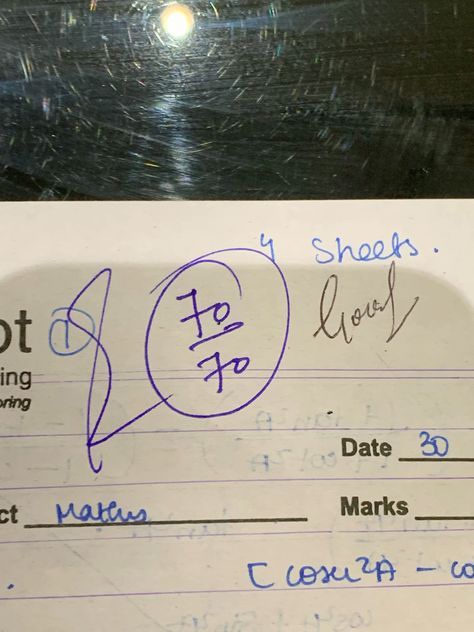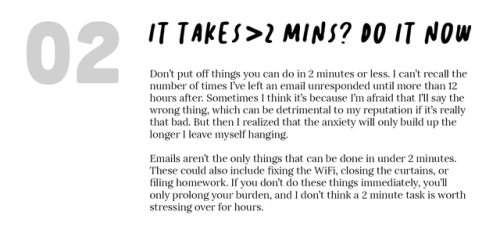How To Stay Motivated Long-term



how to stay motivated long-term
trust, me i know that long-term motivation and consistency is hard. long-term motivation might be difficult to maintain, but there are effective techniques to help you stay focused and determined. whether you're seeking personal ambitions, academic achievements, or professional success, here are some strategies to help encourage motivation:
understand the reason behind your goal ☆ does your goal contribute to personal growth or meaningful relationships? ☆ how does your goal impact others? ☆ is your goal meaningful to you? if your goal lacks meaning, it may be hard to maintain motivation.
positive and negative motivation motivation can come from different places ☆ positive motivation: the desire to experience pleasure ☆ negative motivation: the desire to avoid something (an outcome) both types of motivation have their place, so learn to recognise what type fits in where. (post on this coming soon)
set up systems use your initial motivation to set up structures: ☆ create routines, systems and habits that help you towards your goal even when your motivation fluctuates ☆ when your emotions wane, rely on these systems and disciplines to maintain momentum
break down goals ☆ tackle one goal at a time to avoid feeling overwhelmed ☆ set achievable milestones and celebrate each step forward ☆ keep the momentum going by focusing on manageable tasks
validate good work ☆ give yourself a little reward, or thank yourself, for completing hard tasks ☆ this reinforces motivation and encourages effort
remember--motivation isn't in a constant state, it ebbs and flows. these small tips will help to stay motivated. i'm going to provide more information in upcoming posts, and i will link them here once they are published.
luck on your journey ❤️
More Posts from Lokarprincipal and Others
So cute.
Baby elephant taking their first steps
(via)
Esse tá fora dos trilhos.
Slinky boy
(via)
Realmente preciso disso.







SOURCES + LINKS
Dr. Bradberry, Travis. (January 15, 2018). “How to make yourself work when you don’t want to.” Retrieved from: https://medium.com/the-mission/how-to-make-yourself-work-when-you-dont-want-to-f4f251a85514
MacLellan, Lila. (January 15, 2018). “How to stop procrastinating.” Retrieved from: https://work.qz.com/1159212/how-to-stop-procrastinating/
Sun, Michael. (February 17, 2014). “Psychological Skills: Changing your Emotions - An Intro to Cognitive Reappraisal.” Retrieved from: https://www.psychologyinaction.org/psychology-in-action-1/2014/02/17/psychological-skills-changing-your-emotions-an-intro-to-cognitive-reappraisal
My masterposts, infographics, printables, + more!
Vale a pena aprender a programar.

I was asked to make a masterpost on websites like Codecademy, so I’ve tried to compile a list of the best (and mostly free!!). In no particular order:
1. Codecademy [x]
I couldn’t not include Codecademy! Just in case you haven’t checked it out, it’s pretty neat. It has courses for learning languages and web developer skills.
Languages: Python, Ruby, Java, PHP, jQuery, JavaScript, HTML/CSS
Extras: Git, SQL, Command Line, AngularJS, Ruby on Rails
2. Code School [x]
This is pretty similar to Codecademy with the in-browser coding and such. It also has additional features like teaching videos. A good introduction to programming languages.
Languages: Python, Ruby, Javascript, HTML/CSS
Extra: iOS development with Objective-C or Swift, Git, SQL
3. Learnaroo [x]
Has tutorials followed by mini challenges based on the concepts you’ve just learnt! It also has some reference pages called “Learn x by Example”. Looks pretty good.
Languages: Python, Java, Ruby, HTML/CSS
Extra: Algorithms, Mathematics, + a bunch of premium membership stuff
4. Learn …
A set of related websites (see below) which have mini tutorials on language concepts followed by mini challenges, similar to Learnaroo.
Languages: Python, Java, C, C#, JavaScipt, PHP, Shell
5. Code Combat [x]
Basically, it turns learning to code into a game! As you move through the levels, new concepts are introduced, so the code you need to write to play the game gets harder.
Languages: Python, Java, JavaScript, CoffeeScript, Clojure, Lua
6. Codingame [x]
Similar idea to Code Combat, but a little more advanced.
Languages: Python, Java, Ruby, C, C++, C#, Haskell, VB … there’s actually loads it supports.
7. Code Wars [x]
This is more for ‘training’ with a language you already know. It offers plenty of practice through challenges, so it’s really good for improving your coding skills.
Languages: Python, Ruby, Java, C#, Haskell, JavaScript, CoffeeScript, Clojure
8. Coderbyte [x]
This offers some video tutorials and challenges for a few languages, plus special courses on specific algorithms and bootcamp/interview prep. You need a premium membership for quite a lot of things, though (e.g. I don’t think you can watch any of the videos with a free membership).
Languages: Python, Ruby, JavaScript
Extras: Algorithms, Bootcamp Prep, Job Interview Prep
9. Free Code Camp [x]
Mini tutorials followed by mini challenges. Has a number of courses on the languages below!
Languages: HTML/CSS, jQuery, JavaScript
Extras: Git, Algorithms, + a bunch of projects to complete
10. Programmr [x]
Has courses to learn various languages through doing little exercises/challenges in the browser, similar to previous examples. Also has ‘zones’ for more languages, where you can find challenges, example code and projects people have shared.
Languages: Python, Java, C++, C#, PHP, jQuery
11. CheckIO [x]
Only offers Python, but I still think it’s really great. You move from level to level, getting challenges which are gradually trickier. Learn by doing!
12. Rails for Zombies [x]
For people who already know a bit of Ruby, but nothing about Ruby on Rails! Each level begins with a short video followed by interactive challenges where you program Rails in the browser.
That’s all (for now!) Hope this is helpful! (ノ^∇^)ノ゚
Bela faca. Uma peça de artesanato refinada.

Esse é o meu estado mental.

Linguistics and Language Podcasts
Looking for podcasts about language and linguistics? Here’s a comprehensive list with descriptions! I’ve also mentioned if shows have transcripts. If there are any I missed, let me know!
Linguistics
Lingthusiasm A podcast that’s enthusiastic about linguistics by Gretchen McCulloch and Lauren Gawne (that’s me!). Main episodes every third Thursday of every month, with a second bonus episode on Patreon. (Transcripts for all episodes)
Talk the Talk Every week Daniel, Ben, and Kylie cover the news in linguistics and tackle a particular topic.
The Vocal Fries Every episode Carrie Gillon & Megan Figueroa tackle linguistic discrimination in relation to a particular group. (Transcripts for some episodes)
En Clair A podcast about forensic linguistics from Dr Claire Hardaker at Lancaster University. Episodes released monthly, with a range of topics from criminal cases to literary fraud. (Transcripts for all episodes)
Accentricity From Sadie Durkacz Ryan, a lecturer in sociolinguistics at Glasgow University. Season one has six episodes.
Field Notes Martha Tsutsui Billins interviews linguists about their linguistic fieldwork.
Language
The Allusionist Stories about language and the people who use it, from Helen Zaltzman (Transcripts for all episodes) (my review)
Grammar Girl Episodes are rarely longer than 15 minutes, but they’re full of tips about English grammar and style for professional writing, and more! (Transcripts for all episodes).
The World in Words From PRI, The World in Words has been delivering wonderful interview-drive stories about language and life since 2008.
Conlangery Particularly for those with an interest in constructed languages, they also have episodes that focus on specific natural languages, or linguistic phenomena.
Subtext a podcast about the linguistics of online dating.
Canguro English a podcast about language for people learning languages.
English
History of English Meticulously researched, professionally produced and engaging content on the history of English. I have already reviewed it three times (episodes 1-4, episodes 5-79, bonus episodes).
Lexicon Valley Hosted by John McWhorter, with a focus on English.
That’s What They Say Every week linguist Anne Curzan joins Rebecca Kruth on Michigan public radio for a five minute piece on a quirk of English language.
A Way With Words A talk-back format show on the history of English words, cryptic crosswords and slang.
Dictionaries
Word For Word From Macquarie dictionary, with a focus on Australian English.
Fiat Lex A podcast about making dictionaries from Kory Stamper & Steve Kleinedler.
Words/etymology
Word Bomb Hosts Pippa Johnstone and Karina Palmitesta explore one explosive word per week, using particular words for a deep dive into linguistic and social issues.
Words for Granted In each episode Ray Belli explores the history of a common English word in around fifteen minutes.
Very Bad Words A podcast about swearing and our cultural relationship to it.
Lexitecture Ryan, a Canadian, and Amy, a Scot share their chosen word each episode.
Wordy Wordpecker Short weekly episodes from Rachel Lopez, charting the stories of English words.
Animology Vegan blogger Colleen Patrick Goudreau uses her love of animals as a starting point for exploring animal-related etymologies.
Translation
Speaking of Translation A monthly podcast from Eve Bodeux & Corinne McKay.
LangFM Stories of people from the world of language, including interpreters, translators, dialect coaches and many more.
Troublesome Terps The podcast about the things that keep interpreters up at night.
Back catalogues and Odds & Ends
There are also a number of podcasts that have only a few episodes, are no longer being made, or are very academic in their focus:
Language Creation Society Podcast (8 episodes, 2009-2011)
Given Names (four part radio series from 2015, all about names. My review)
Speculative Grammarian Podcast (from the magazine of the same name, about 50 episodes from Dec 2009-Jan 2017)
Linguistics Podcast (on YouTube, around 20 episodes in 2013 introducing basic linguistic concepts)
Evolving English: Linguistics at the Library (8 episodes 2018), from the British Library.
How Brands are Build (season 1 of this show focuses on brand naming)
The Endless Knot is not strictly a language podcast, but they often include word histories, fans of the Lingthusiasm colour episode may find their colour series particularly interesting
Word of Mouth (BBC 4, also available as a podcast)
LingLab (very occasionally updated podcast from graduate students in the Sociolinguistics program at NC State University)
Silly Linguistics (ad hoc episode posting, but episode 7 is an interview with Kevin Stroud for History of English fans)
WACC Podcast (guest lectures at Warwick Applied Linguistics)
Sage Language and Linguistics
Let’s Talk Talk
Queer Linguistics has a couple of episodes, with a bit of classroom vibe
GradLings An occasionally-updated podcast for linguistics students at any stage of study, to share their stories and experiences.
This is a completely revised listing from March 2019, with some sporadic updates. I’m always excited to be able to add more podcasts to the list, so if you know of any linguistics/language podcasts not here, please let me know! (I usually wait until a show has at least 3 episodes before I add it to the list)
Um lugar bem peculiar.

Good more knowledge.

-
 terracebird liked this · 1 month ago
terracebird liked this · 1 month ago -
 wildendeavours reblogged this · 1 month ago
wildendeavours reblogged this · 1 month ago -
 sublimecherryblossomobservation liked this · 2 months ago
sublimecherryblossomobservation liked this · 2 months ago -
 bag-end-dweller reblogged this · 2 months ago
bag-end-dweller reblogged this · 2 months ago -
 hayourdadgon reblogged this · 2 months ago
hayourdadgon reblogged this · 2 months ago -
 hayourdadgon liked this · 2 months ago
hayourdadgon liked this · 2 months ago -
 nomnomkoo liked this · 3 months ago
nomnomkoo liked this · 3 months ago -
 loeycism liked this · 3 months ago
loeycism liked this · 3 months ago -
 dreamer-kisses liked this · 3 months ago
dreamer-kisses liked this · 3 months ago -
 whatteefleur reblogged this · 3 months ago
whatteefleur reblogged this · 3 months ago -
 whatteefleur liked this · 3 months ago
whatteefleur liked this · 3 months ago -
 geometricpenguin liked this · 3 months ago
geometricpenguin liked this · 3 months ago -
 brooklynbabek liked this · 3 months ago
brooklynbabek liked this · 3 months ago -
 pitselehslezzingout liked this · 3 months ago
pitselehslezzingout liked this · 3 months ago -
 felicitymarisol liked this · 3 months ago
felicitymarisol liked this · 3 months ago -
 anissaphoolsawat liked this · 3 months ago
anissaphoolsawat liked this · 3 months ago -
 externus liked this · 3 months ago
externus liked this · 3 months ago -
 jessholod reblogged this · 3 months ago
jessholod reblogged this · 3 months ago -
 jessholod liked this · 3 months ago
jessholod liked this · 3 months ago -
 freebri liked this · 3 months ago
freebri liked this · 3 months ago -
 kit-ssune liked this · 3 months ago
kit-ssune liked this · 3 months ago -
 secretnotsecretdiary reblogged this · 3 months ago
secretnotsecretdiary reblogged this · 3 months ago -
 whatever-chantal liked this · 4 months ago
whatever-chantal liked this · 4 months ago -
 pinkiepromis liked this · 4 months ago
pinkiepromis liked this · 4 months ago -
 st-illbitter liked this · 4 months ago
st-illbitter liked this · 4 months ago -
 bibilearnsstuff reblogged this · 4 months ago
bibilearnsstuff reblogged this · 4 months ago -
 lyramiii liked this · 4 months ago
lyramiii liked this · 4 months ago -
 spaceisntfarenough reblogged this · 4 months ago
spaceisntfarenough reblogged this · 4 months ago -
 spaceisntfarenough liked this · 4 months ago
spaceisntfarenough liked this · 4 months ago -
 whoisrobcrombie liked this · 4 months ago
whoisrobcrombie liked this · 4 months ago -
 robswifey liked this · 4 months ago
robswifey liked this · 4 months ago -
 produtivities reblogged this · 4 months ago
produtivities reblogged this · 4 months ago -
 produtivities liked this · 4 months ago
produtivities liked this · 4 months ago -
 markiesparkly liked this · 4 months ago
markiesparkly liked this · 4 months ago -
 kala-trek liked this · 4 months ago
kala-trek liked this · 4 months ago -
 miikang liked this · 4 months ago
miikang liked this · 4 months ago -
 tatianaaah liked this · 4 months ago
tatianaaah liked this · 4 months ago -
 asomewhatchinadoll liked this · 4 months ago
asomewhatchinadoll liked this · 4 months ago -
 godivagames liked this · 4 months ago
godivagames liked this · 4 months ago -
 mysticpeacemiracle liked this · 4 months ago
mysticpeacemiracle liked this · 4 months ago -
 introvertirl07 liked this · 4 months ago
introvertirl07 liked this · 4 months ago -
 crisslyntify liked this · 4 months ago
crisslyntify liked this · 4 months ago -
 jenn1-1 liked this · 4 months ago
jenn1-1 liked this · 4 months ago -
 chadeartemisia reblogged this · 4 months ago
chadeartemisia reblogged this · 4 months ago